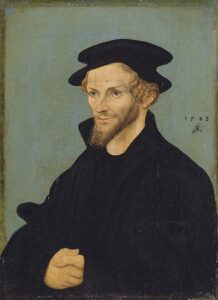 On 16th February 1497, German humanist, reformer and scholar, Philip (or Philipp) Melancthon, was born at Bretten in Germany.
On 16th February 1497, German humanist, reformer and scholar, Philip (or Philipp) Melancthon, was born at Bretten in Germany.
Elizabeth I was said to have memorised his 1521 work "Loci Communes".
Here are a few facts about this famous reformer:
- His father, Georg Schwarzerdt was armourer to Philip the Upright, Count Palatine of the Rhine.
- He was born with the surname Schwarzerdt, meaning “black earth”, but changed it to the Greek equivalent, Melancthon, a suggestion of his humanist great-uncle, Johann Reuchlin.
- He studied philosophy, rhetoric, astronomy, astrology, Greek, law, mathematics, medicine and theology.
- His first published works were not theological works, they were poems, followed by a Greek grammar.
- He became a professor of Greek at Wittenberg University at the age of 21.
- In 1520, he married the Mayor of Wittenberg’s daughter, Katharine Krapp, and they went on to have four children.
- Melancthon was a friend and colleague of Martin Luther, defending Luther’s views in a 1521 work.
- Melancthon worked hard, beginning his day at 2am and starting lectures to his students at 6am.
- Melancthon’s works include his 1521 Loci Communes, which the Encyclopaedia Britannica describes as “the first systematic treatment of the new Wittenberg theology developed by Luther” and which Queen Elizabeth I was said to have memorised.
- Melancthon also had a major influence on education in Germany through an educational plan he published. He also founded several universities and reformed others. He became known as “Preceptor of Germany.”
- In 1530, the Augsburg Confession, a confession of the faith of the Lutheran Church was put before the Diet of Augsburg. It had been prepared by Melancthon and is known as one of the most important documents of the Protestant Reformation.
- Melancthon believed in justification by faith and scriptural authority, and his beliefs regarding the Eucharist were more Calvinist, i.e. that the body and blood of Christ are not present in the bread and wine. He believed that God offered the gift of salvation but that a person must accept or reject it: “God draws, but he draws him who is willing”. He believed in good works as an expression of faith.
- At the beginning of April 1560, Melancthon came down with a cold and then a fever, which gradually weakened him. His 19th century biographer, James William Richard, writes that as his end drew near, his son-in-law, Dr Peucer, asked him if he needed anything and he answered “Nothing else but heaven”. Melancthon died on the evening of 19th April 1560. Richard writes that the inscription in Latin on his coffin recounted “the chief events of his life, as that he had served the University of Wittenberg forty-two years, was the faithful assistant of Luther in the purification of doctrine, was the author of the Augsburg Confession, and the firm defender of divine truth, publicly and privately, in diets and by his writings.” He was laid to rest beside Martin Luther at Wittenberg, in All Saints Church, Schloßkirche.
- If you want to read more about him, James William Richard’s 19th century biography is available to read online, Philip Melanchthon, the Protestant preceptor of Germany, 1497-1560 - https://archive.org/details/philipmelanchtho00richuoft
Also on this day in Tudor history...
Image: Portrait of Philip Melancthon by Lucas Cranach the Elder



Thanks for sharing this intriguing piece on Philip Melancthon! It’s fascinating to learn about his background and contributions. His role in the Protestant Reformation and theological beliefs are equally thought-provoking. You have a very good source when I need to ask for help with writing my historical essays. Here’s the link I use to find writing help with my essays: https://letsgradeit.com/review/bestessays/. I always show writers the source from which I want to draw information for my essays. I’m looking forward to delving deeper into his life through the provided biography link.